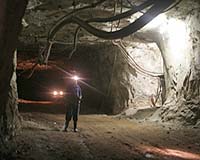 |
Paris (AFP) May 15, 2009 France and Pakistan have agreed to cooperate in the nuclear field, officials said Friday, with Islamabad claiming an important breakthrough in its bid to be seen as a responible nuclear power. Following talks between France's President Nicolas Sarkozy and Pakistani counterpart Asif Ali Zardari, the French leader's office said he had offered to help Pakistan improve its "nuclear safety" capability. Pakistani Foreign Minister Shah Mahmood Qureshi went further, saying France had agreed to a transfer of civilian nuclear energy technology, despite international concerns over the stability of Pakistan's government. Sarkozy's office would not comment on Qureshi's statements, and any such deal -- while a diplomatic coup for Zardari -- would need the agreement of other nuclear powers and the United Nations nuclear watchdog, the IAEA. France is a major exporter of nuclear technology, and in February agreed to supply Pakistan's rival India with between two and six modern reactors. "France has agreed to transfer civilian nuclear technology to Pakistan," Qureshi told reporters, explaining that Pakistan was suffering an "energy crisis" and needed nuclear power to guarantee its electricity supply. In addition to maintaining a small arsenal of nuclear armed missiles, Pakistan has a civilian nuclear energy programme developed with Chinese aid, with one working power station and another under construction. A spokesman for the French presidency said Sarkozy had "confirmed France was ready, within the framework of its international agreements, to cooperate with Pakistan in the field of nuclear safety." "This is so the Pakistani programme can develop in the best conditions of safety and security," he added. Among Western powers, Islamabad has been treated as a nuclear pariah since 2004, when Pakistani weapons scientist Abdul Qadeer Khan admitted that he had illegally shared technology with Libya, Iran and North Korea. And with Taliban rebels fighting increasingly fierce battles with security forces barely 100 kilometres (62 miles) outside the Pakistani capital, fears have been raised that nuclear arms could fall into Islamist hands. Qureshi hailed the French offer as an important sign of his government's credibility. "That is a significant development, and we have agreed that Pakistan should be treated like India. President Sarkozy said, and I quote him, 'What can be done for India, can be done for Pakistan as well.'," he said. Neither India nor Pakistan, which both maintain nuclear missile arsenals, have signed the 1970 Nuclear Non-Proliferation Treaty, and foreign powers were therefore forbidden from sharing technology with them. India, however, negotiated bilateral nuclear agreements with the United States, Russia and France, and the International Atomic Energy Agency (IAEA) has now allowed Delhi in from the nuclear cold. Now Pakistan wants to follow suit. "Pakistan has no issues with the IAEA ... Pakistan will give all necessary international guarantees," Qureshi insisted. "The world recognises the steps Pakistan has taken to assure and protect its nuclear assets. Everyone who matters is confident about our arrangements, the three-layer security system that we have put in place." Asked when French shipments might begin, he said: "Today, in principle, the two countries agreed that there is a necessity that has to be fulfilled. In principle they've agreed, and now the modalities will be worked out." Earlier, Zardari came away from the talks with a promise of 12 million euros (16.2 million dollars) in French aid for civilian refugees fleeing fighting between the army and Taliban rebels. "There may be concern always everywhere, but there is support and there is confidence in the world that democracy has always delivered," said Zardari, who was elected last year after the military ceded power. Share This Article With Planet Earth
Related Links Nuclear Power News - Nuclear Science, Nuclear Technology Powering The World in the 21st Century at Energy-Daily.com
 Russia, Japan agree nuclear energy pact
Russia, Japan agree nuclear energy pactTokyo (AFP) May 12, 2009 A nuclear energy agreement signed by Japan and Russia Tuesday will pave the way for contracts worth billions of dollars, the head of Russia's state nuclear agency said Tuesday. The accord, which was inked during Russian Prime Minister Vladimir Putin's visit to Tokyo, will allow for the transfer of Japanese technology to Russia and the sale of more nuclear fuel to energy-poor Japan. It wi ... read more |
|
| The content herein, unless otherwise known to be public domain, are Copyright 1995-2009 - SpaceDaily. AFP and UPI Wire Stories are copyright Agence France-Presse and United Press International. ESA Portal Reports are copyright European Space Agency. All NASA sourced material is public domain. Additional copyrights may apply in whole or part to other bona fide parties. Advertising does not imply endorsement,agreement or approval of any opinions, statements or information provided by SpaceDaily on any Web page published or hosted by SpaceDaily. Privacy Statement |